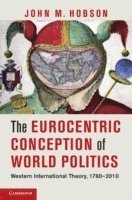
- Format
- Häftad (Paperback)
- Språk
- Engelska
- Antal sidor
- 406
- Utgivningsdatum
- 2012-03-29
- Utmärkelser
- Francesco Guiccardini Prize, Historical International Relations Section (HIST), International Studies Association
- Förlag
- Cambridge University Press
- Illustratör/Fotograf
- 18 b, w illus 6 tables
- Illustrationer
- 18 b/w illus. 6 tables
- Dimensioner
- 226 x 152 x 20 mm
- Vikt
- Antal komponenter
- 1
- Komponenter
- 23:B&W 6 x 9 in or 229 x 152 mm Perfect Bound on White w/Gloss Lam
- ISBN
- 9781107604544
- 636 g
The Eurocentric Conception of World Politics
Western International Theory, 1760-2010
- Skickas från oss inom 7-10 vardagar.
- Fri frakt över 249 kr för privatkunder i Sverige.
Passar bra ihop
De som köpt den här boken har ofta också köpt Don't Believe Everything You Think av Joseph Nguyen (häftad).
Köp båda 2 för 551 krKundrecensioner
Fler böcker av John M Hobson
-
The Eastern Origins of Western Civilisation
John M Hobson
-
Eastern Origins of Western Civilisation
John M Hobson
-
Everyday Politics of the World Economy
John M Hobson, Leonard Seabrooke
-
The Wealth of States
John M Hobson
Recensioner i media
'Hobson's powerful indictment that international theory merely constructs a Eurocentric conception of world politics represents a significant challenge to theorists both of mainstream and critical persuasions. In light of the broad intellectual history that Hobson provides, this book will be of immense interest to a diverse audience of readers.' Brian C. Schmidt, Carleton University
'A masterful and provocative history of Western International Theory that challenges IR scholars to be sensitive to the Eurocentric biases of their intellectual heritage. This important and carefully reasoned book is a call to all of us to re-examine the moral and ethical implications of our research.' J. Ann Tickner, University of Southern California
'John M. Hobson's ambitious, searching, and wide-ranging critique of a long line of thinkers - from Immanuel Kant, Adam Smith, to Hans Morgenthau - whose writings gave Western International Theory its current shape, is a tour de force. Not only does Hobson point up the persistently Eurocentric organization of the field, he also succeeds in making careful and important distinctions between varieties of Orientalism and Eurocentrism that are usually missing from contemporary analyses. All students of 'world politics' will benefit from this book that represents one of the finest contributions to date to postcolonial studies of international theory.' Dipesh Chakrabarty, University of Chicago
'[Hobson's] book will be necessary reading for all those interested in IR.' Patrick Chabal, International Affairs
Övrig information
John M. Hobson is Professor of Politics and International Relations at the University of Sheffield. His publications include Everyday Politics of the World Economy (2007), co-edited with Leonard Seabrooke; The Eastern Origins of Western Civilisation (2004); Historical Sociology of International Relations (2002), co-edited with Steve Hobden and The State and International Relations (2000).
Innehållsförteckning
1. Introduction: constructing Eurocentrism and international theory as Eurocentric construct; Part I. 1760-1914: Manifest Eurocentrism and Scientific Racism in International Theory: 2. Eurocentric imperialism: liberalism and Marxism, c.1830-1914; 3. Eurocentric anti-imperialism: liberalism, c.1760-1800; 4. Racist anti-imperialism: liberalism and cultural-realism, c.1850-1914; 5. Racist imperialism: 'racist-realism', liberalism, and socialism, c.1860-1914; Part II. 1914-1945: Manifest/Subliminal Eurocentrism and the High Tide of Scientific Racism in International Theory: 6. Anti-imperialism and the myths of 1919: Eurocentric Marxism and racist cultural-realism, 1914-1945; 7. Racist and Eurocentric imperialism: racist-realism, racist-liberalism, and 'progressive' Eurocentric liberalism/Fabianism, 1914-1945; Part III. 1945-1989: Subliminal Eurocentrism in International Theory: 8. Orthodox subliminal Eurocentrism: from classical realism to neorealism, 1945-1989; 9. Orthodox subliminal Eurocentrism: neo-liberal institutionalism and the English school, c.1966-1989; 10. Critical subliminal Eurocentrism: Gramscianism and world-systems theory, c.1967-1989; Part IV. 1989-2010: Back to the Future of Manifest Eurocentrism in Mainstream International Theory: 11. Imperialist and anti-imperialist Eurocentrism: post-1989 'Western-realism' and the spiritual return to post-1889 racist-realism; 12. Imperialist Eurocentrism: post-1989 'Western-liberalism' and the return to post-1830 liberal paternalist Eurocentrism; Part V. Conclusion: Mapping the Promiscuous Architecture of Eurocentrism in International Theory, 1760-2010: 13. Constructing civilization: global hierarchy, 'gradated sovereignty' and globalization in international theory, 1760-2010; Bibliography; Index.
Du kanske gillar
-
Knife
Salman Rushdie
InbundenFrågor & svar


